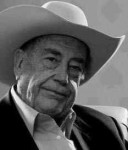
Note: Not at the old Poker1 site. A version of this entry was first published in the London Telegraph in 2005.
Historical note: The following explanatory note didn’t appear in the series, but was sent with each column as submitted.
Doyle “Texas Dolly” Brunson stands unchallenged as the most celebrated poker player who ever lived. In 2005, at age 72, he won an unprecedented 10th championship gold bracelet at the World Series of Poker. He is among the few living members of the Poker Hall of Fame, and his books are the bibles for poker professionals.. Through www.poker1.com and www.doylesroom.com, Brunson has teamed with Mike Caro, today’s premiere poker educator, to offer a free learning experience to players worldwide. This column is founded on those collaborative teachings.

Pride makes you play better. Too much pride can pummel anyone. I remember an incident where too much pride caused a bizarre poker happenstance.
The game was Kansas City lowball, a five-card draw game also known as deuce-to-seven. That latter name underscores the fact that the best hand contains a deuce and a seven and no pair. The specific best hand is 7-5-4-3-2 of at least two different suits. That’s because the object is to get the worst conventional poker hand. Consider it poker stood on its ears.
Walking through a casino, I spot a KC game that was unusual in a couple respects. One was that they were playing limit, where the betting amounts are predetermined. That’s odd, because normally KC is played no-limit. But also it has a “kill” rule, which means any player is allowed to put in an amount double the size of the big blind and the stakes are then doubled. While I welcome the option to my game, I seldom participate in the kill process. Sometimes it may help your position or your leverage, but basically you have to put up money without looking at cards. It’s like voluntarily forcing yourself to take a blind when you don’t have to. But this kill rule was unusual. You didn’t have to do it completely blind – you could look at your first two cards and then decide to kill.
Disadvantage
Even at that, I would only kill rarely, had I played in this game. One disadvantage is that you’re still a large underdog to end up with a significant pat hand or a great one-card draw. Another disadvantage is that by killing, you’re alerting opponents that you might have that perfect or near-perfect hand. On the occasions that the last three cards provide you with a great hand, opponents will be less likely to give you as much action as they would had you not “killed the pot.”
Now back to the pride issue. There’s a disheveled, bearded kid who looks at his first two cards and kills by doubling the big blind voluntarily.
Another man in a business suit complains to the dealer: “He looked at three cards!”
The dealer correctly rules that other cards were not touched and that the scraggly kid had only looked at two and could legally kill. But I could see that the kid’s ego was damaged. You could almost read on his face the words he was thinking. “I’m an honest player. Why would you think I’d do that?”
I could see his whole hand. It was 7-6-4-3-2, the second-best hand possible. But I realized there might be fireworks, because the businessman was going to be even more irritated when he lost this pot and even more convinced that the kid had unfairly looked at a third card.
Honor
The businessman drew one card and the kid completely wrecked his hand by drawing three. In doing so, he announced, “Now that I’m only keeping two cards, which three do you think I looked at?” His intention was to restore his honor. Even though he’d done nothing wrong, his pride wouldn’t let anyone think that he might have.
You can guess the outcome of this hand, right? The kid made a miracle draw and caught an eight-high hand, but it wasn’t quite good enough. That’s when the kid stormed away from the table.
He had learned the price of too much pride. — DB
